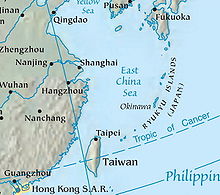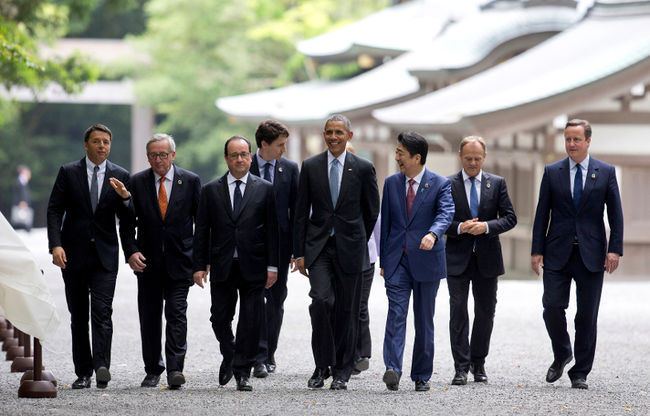by Robert Whitcomb | Aug 16, 2016 | News
Japanese Prime Minister Shinzo Abe and leaders of some other major U.S. allies are worried about the possible policy of “no first use” of nuclear weapons being considered by the Obama administration. The fear is that such a policy would weaken the ability to deter aggressive dictatorships such as North Korea.
South Korea, France and Britain are also said to have privately communicated their concerns to U.S. officials about a potential declaration by President Obama of such a policy.
If Mr. Obama were to declare a no-first-use policy, it would represent a major change in the U.S. nuclear posture.
To read a Japan Times story on this topic, please hit this link.
by Robert Whitcomb | Aug 8, 2016 | News
Japanese Emperor Akihito, in a rare televised address to the nation, talked about his ill health and cast doubts on his ability to carry out his duties as emperor much longer. He said that he wanted an orderly imperial family succession. Observers speculated that perhaps a regent might be appointed.
But Japanese law says the emperor must serve until death and is barred from appealing directly to be allowed to retire or abdicate. Thus legal changes may be needed for Emperor Akihito to step aside.
To read The Guardian’s story on this, please hit this link.
by Robert Whitcomb | Jul 26, 2016 | News
Japanese Foreign Minister Fumio Kishida wants Japan to host a trilateral summit with South Korea and China soon. One of the topics is bound to be what to do about North Korea’s saber-rattling.
“The cooperation of Japan, China and South Korea has completely been normalized,” Mr. Kishida said recently.
To read The Japan Time’s story on this, please hit this link.
by Robert Whitcomb | Jul 15, 2016 | AI World Society Summit

Emperor Akihito.
The Japanese government has begun work to revise the law governing the imperial family system to permit an emperor to abdicate. Emperor Akihito wants to abdicate, government sources have said. He has been treated for prostate cancer and heart problems.
The 82-year-old monarch is expected to soon speak about his desire to hand over the throne to his 56-year-old son, Crown Prince Naruhito.
The Japan Times noted: “Revision to the Imperial House Law is necessary for an emperor to relinquish the throne while still alive, as the law does not provide for abdication. No succession from a living emperor has taken place for about 200 years.”
Read The Japan Time’s article on this by hitting this link.
by Robert Whitcomb | Jul 5, 2016 | News

China has strongly criticized Japan over a scramble of military aircraft from the two countries amid a dispute over islands in the East China Sea.
Japan is in an old dispute with China over ownership of a group of islands northeast of Taiwan, known as the Senkakus in Japan and the Diaoyus in China.
The Chinese Defense Ministry said that two Japanese fighter jets took “provocative actions” at a high speed near a pair of Chinese fighter jets patrolling the sea on June 17.
The Japanese planes used radar to “light up” the Chinese aircraft, the Chinese statement added. Japan has acknowledged that there was a scramble but has denied that there was any radar lock.
“The Japanese plane’s provocative actions caused an accident in the air, endangering the safety of personnel on both sides, and destroying the peace and stability in the region,” China’s Defense Ministry said.
Japan has accused China of escalating military activity in the East China Sea, saying that Japanese emergency scrambles to counter Chinese jets have almost doubled over the past three months.
Reuters reports that Japan “is worried that China is escalating its activity in the East China Sea in response to Tokyo’s pledge to support countries in Southeast Asia, including the Philippines and Vietnam, that oppose China’s territorial claims in the South China Sea.”
To read the Reuters article on this, please hit this link
by Robert Whitcomb | Jun 24, 2016 | News
U.S. Vice President Joseph Biden has warned Chinese President Xi Jinping that Japan could acquire nuclear weapons “virtually overnight.”
Mr. Biden said that he had urged Mr. Xi to push North Korea to abandon its missile and nuclear- weapons developments. But it is highly unlikely that China will push its fellow dictatorship to do s0.
The vice president was referring to Pyongyang’s recent nuclear test and missile launches in violation of U.N. Security Council resolutions.
Mr. Biden said North Korea is building nuclear weapons that can strike as far as away the U.S. mainland. “And I say, so we’re going to move up our defense system,” suggesting that America will deploy an advanced U.S. missile interception system called Terminal High Altitude Area Defense, or THAAD, in South Korea.
The vice president quoted Mr. Xi as saying, “Wait a minute, my military thinks you’re going to try to circle us.”
Japanese Deputy Chief Cabinet Secretary Hiroshige Seko asserted June 24 that Japan “can never possess nuclear weapons.”
To read The Japan Times’s story on this, please hit this link.
by Robert Whitcomb | Jun 16, 2016 | AI World Society Summit
JTB Corp., Japan’s largest travel agency, has suffered a huge hack, perhaps by Chinese and/or North Korean government hackers. The government-backed company says that the hackers might have gotten the passport details and other personal information of almost 8 million customers.
The hack focused more attention on the risks for companies when they keep sensitive data on networks connected to the Internet.
Japanese firms and government agencies should consider isolating their networks, Vitaly Kamluk, principal security researcher at Russian-owned Kaspersky Lab in Singapore, told The Japan Times.
To read the whole Japan Times article, please hit this link.

by Robert Whitcomb | May 26, 2016 | Initiative
(May 30th, 2016) The Group of Seven (G7) leaders agreed on May 26 at their summit in Japan on the need to send a strong message to China about its maritime claims in the western Pacific, where an increasingly aggressive China has territorial disputes with Japan and several Southeast Asian nations. China has been seizing and militarizing some disputed islands and reefs in the region and threatening nations in the region that have challenged the seizures.

“Prime Minister (Shinzo) Abe led a discussion on the current situation in the South China Sea and East China Sea. Other G7 leaders said it is necessary for G7 to issue a clear signal,” Japan’s Deputy Chief Cabinet Secretary Hiroshige Seko told reporters after a session on foreign policy.
At a news conference late on Wednesday, Mr. Abe said that Japan welcomed China’s peaceful rise. But he repeated Tokyo’s opposition to acts aimed at changing the status quo by force and urging respect of the rule of law.
Chinese Foreign Ministry spokeswoman Hua Chunying retorted in Beijing that the South China Sea issue had “nothing to do” with the G7 or any of its members.
“China is resolutely opposed to individual countries hyping up the South China Sea for personal gain,” she said.
U.S. President Obama called on China to resolve maritime disputes peacefully and he reiterated that the United States was concerned about freedom of navigation and overflights in the region, through which 30 percent of world trade passes.
Read more


